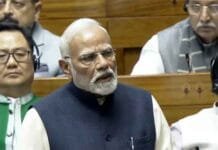The government is preparing to introduce the much-awaited Waqf Bill in the Lok Sabha on April 2, 2025, marking a pivotal moment in the ongoing budget session of Parliament. With only four days left in the session, the government has rushed to bring this significant piece of legislation to the floor, hoping to navigate through a complex political landscape and pass it within the remaining time.
The Waqf Amendment Bill, which was first introduced in the previous session of Parliament amid substantial opposition uproar, has been a subject of heated debate. It was sent to a Joint Parliamentary Committee (JPC) for further review. Now, sources indicate that the government intends to reintroduce it in the Lok Sabha on April 2, immediately following the Eid holidays.
If successfully introduced, the government will have only two days to secure its passage from both the Lok Sabha and the Rajya Sabha before the budget session concludes on April 4, 2025.
Government’s Strategy to Push the Bill Through
The Waqf Bill, which aims to amend the Waqf Act, was initially sent to the JPC in August 2024. After reviewing the recommendations, the government has prepared a revised version of the bill, expecting smoother passage this time. The Bharatiya Janata Party (BJP) is confident that it has sufficient support within its allies, particularly JDU, TDP, and Lok Janshakti Party (LJP), to ensure the bill’s success.
Despite this, the opposition parties are actively working to sway BJP’s allies, hoping to disrupt the government’s momentum. However, BJP sources suggest that these concerns have been addressed and that the allied parties’ support for the bill remains strong.
The Opposition’s Reaction: Concerns and Criticism
As the Waqf Bill heads towards its introduction, opposition parties continue to voice their concerns, claiming the bill could negatively affect Muslim communities. However, Home Minister Amit Shah has fiercely countered these claims, stating that the bill is in line with constitutional guidelines and will not curtail any rights of Muslims.
In a public statement, Shah clarified, “The opposition is misleading the Muslim community. The Waqf Bill is being introduced within the framework of the Indian Constitution. No rights of Muslims will be harmed by this amendment.”
The BJP’s Confidence Amidst Opposition
Shah’s statements indicate the government’s determination to push the bill through, even amid opposition protests. It’s also believed that while the bill may face resistance in the Rajya Sabha, the government is confident it can garner the support of smaller parties to pass it in the upper house.
Although the BJP does not have a majority in the Rajya Sabha, it has been successful in passing significant bills in the past through strategic floor management. The government is expected to focus on this as the session comes to a close.
What’s Next for the Waqf Bill?
The bill is likely to spark intense debates in Parliament, with some factions pushing for amendments while others seek to block its passage. As the budget session nears its conclusion, the government’s ability to pass this bill will be closely watched by both political analysts and the public.
With just days left before the session ends, all eyes will be on the Lok Sabha as the Waqf Bill makes its grand return to Parliament. Will it pass, or will it face another round of political hurdles?















